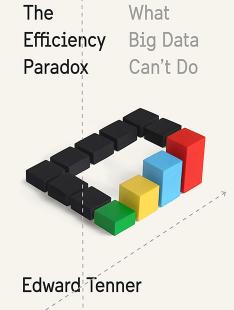
The author: Edward Tenner ’65 is a scholar at the Smithsonian’s Lemelson Center for the Study of Invention and Innovation. He has written other books about technology, including Our Own Devices: How Technology Remakes Humanity.
Opening lines: “This book is a critique of something self-evidently desirable, even wonderful, until it isn’t: efficiency. And it’s also about an apparent oxymoron that seems absurd until we realize that it’s also been essential: inspired efficiency. Efficiency is mostly good but like all good things can be carried too far; even an excess of water can be lethal.
More than twenty years ago at the dawn of the web as we know it, when I wrote my first book on the unintended consequences of technology Why Things Bite Back published in 1996, the idea of efficiency itself as a threat hardly occurred to me. In fact, far from allying with the critics who called themselves neo-Luddites (a term now shared by their friends and foes), I was an early adopter and enthusiast. As a science book editor recruiting authors globally and affiliated with a university offering email, I had already been corresponding and setting up appointments. As a researcher already using electronic databases, I found the new web browser and the graphic interface a welcome improvement. As a writer always tinkering with my text, I had embraced word processing since the days of the TRS-80 in the early Reagan era. Remembering the tedium of retyping and the mess of carbon paper, I felt (and feel) no nostalgia for my own typewriting though I do find that the typewritten letter has a distinctive graphic personality through the “bite” of letters in the paper and the varying impressions created by carbon ribbons from saturated to faint. …
Beginning around 2005, the new hyperefficient world entered a different phase. With the introduction of the Apple iPhone in 2007, made possible by the rapid evolution of computer processing speed, electronic devices were gradually ceasing to be tools that people used and put away, and becoming extensions of their selves and their personal and professional networks. At the same time the exceptionally efficient search engine Google and the social networking site Facebook, together with Amazon, were transforming online commerce by adding a new level to the internet, the platform, between the corporate website and the open web.
Since 2008, the dream of utopia through ever-increasing electronic efficiency has been dimmed. …”
Reviews: "A marvel of unexpected wisdom and startling examples. … A compelling guide through the thicket of choices as we gather knowledge to ease the path to the future.” —Gary Allen Fine, sociology professor at Northwestern University

